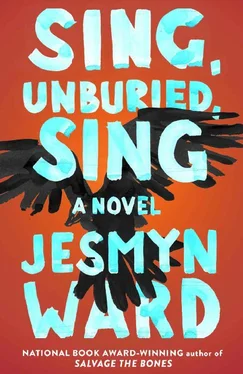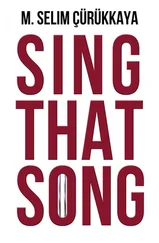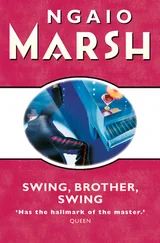“Everything got power.”
He hit a log.
“My great-granddaddy taught me that.”
The log split.
“Said there’s spirit in everything. In the trees, in the moon, in the sun, in the animals. Said the sun is most important, gave it a name: Aba. But you need all of them, all of that spirit in everything, to have balance. So the crops will grow, the animals breed and get fat for food.”
He put another log on the stump, and I breathed into my hands, wishing I had a hat for my ears.
“Explained it to me like this: if you got too much sun and not enough rain, crops will wither. If you got too much rain, they rot in the ground.”
He swung again.
“You need a balance of spirit. A body, he told me, is the same way.”
The logs fell.
“Like this. I’m strong. I can split this wood. But maybe if I had some of the boar’s strength, a little bit of wild pig’s tusk at my side, something to give me a little bit of that animal’s spirit, then maybe, just maybe,” he huffed, “I’m better at this. Maybe it come a little easier to me. Maybe I’m stronger.”
He split another.
“But never more than I could handle. The boar share so much, and I take so much. No waste. Waste rots. Too much either way breaks the balance.” He rested his axe on the ground. “Get me another log.”
I returned from the pile, put the wood on the stump, balanced it just so. Snatched my hand away as Pop brought the axe down, clean through the center of it.
“Or a woodpecker could share something, too. A feather, for aim.”
My finger stung from the nearness of that blade, how close Pop come to my hand.
“That’s what you keep in your pouch?” I asked. I’d noticed his small pouch when I was four or five, and I’d asked him what he kept in it. He never told me.
Pop smiled.
“Not that,” he said. “But close.”
When that next log split, I looked up at Pop and shook, felt that splintering in my baseball knees, my bat spine, my glove of a skull. Wondered what power he had running through him. Where it come from. I lay my head on the seat in Leonie’s car, rubbing the pouch Pop gave me, and wonder if he ever gave a small sack, full of things to balance, to anyone else. His brother Stag? Mam? Uncle Given? Leonie? Or even the boy Richie? And then I hear Pop:
Richie wasn’t built for work. He wasn’t built for nothing really, on account he was so young. He ain’t know how to work a hoe, didn’t have enough years in his arms for muscle, or to know how break the earth good, or to pull with just enough power to clean the bolls from a plant instead of leaving little half tufts of white, ripping the cotton in two. He wasn’t like you; you already filling out, getting longer through the shoulders, longer in the leg. You built like me, like my daddy—good stock. But whoever his daddy was must have been skinny, weak muscled. Maybe short. He was a bad worker. I tried to help him. Tried to break his line when he was hoeing, dig a little deeper in his grooves. Reach over and clean his plants better when we was harvesting. Pull his weeds. And mine. And for a while, a few months, it worked. I was able to save him, kept him from getting beat. I worked myself so hard I was sleep before my body even hit my bunk. Sleep on the fall. I kept my eyes on the ground. Ignored the sky, all that open space pushing down that made fear gather in my chest, a bloated and croaking toad. But then one Sunday when we was doing laundry, scrubbing our clothes on the washboards with soap that was so weak everything smelled a little less like wet-stink but still didn’t smell good, Kinnie Wagner rode by with the dogs.
Kinnie was the inmate caretaker for the dogs. He was a legend, even then. I knew about Kinnie. All of us did. They sang songs about him in the hill country of Tennessee, down through the Delta, all the way to the coast. He bootlegged and brawled and stole and killed. Had the truest shot I ever saw. Even though he’d already escaped Parchman once, and one of them break-proof prisons in Tennessee too, they still put him over the dogs. Even though he put more than one lawman in the dirt. Poor White people all through the South loved him for it, loved him for spitting in the eye of the law. For blinding it. For being lawless in the lawless South, worse than the frontier, for standing like David in an Old Testament place, where for a century before Parchman, law had been meted out like this, Jojo: eye for an eye, tooth for tooth, hand for hand, foot for foot. I think even the superintendents respected him. Anyway, Kinnie and some of the men he’d chosen to help him was on their way to drill the dogs, to train to scent. And one of the men that ran with the dogs was dragging. Maybe he was sick. Maybe he had been whipped. I don’t know. But the short man fell, and his dogs broke loose, ran away from his dusted-over face, his receding belly, and ran to me. Hopped around me like big barking rabbits. Let they tongue hang. Kinnie, who was a big White man, six foot three, probably damn near three hundred pounds, laughed. Told the Black man on his knees in the clay: Nigger, you more trouble than you worth. And then pointed one of them big sausage fingers at me and said: You look skinny enough. I hung the pants I was wringing on the line on the way over to him. Took as much time as I could, because he was the type of man who expected me to run. To look at his big, healthy whiteness in awe. When I came, the dogs came with me, ears flopping, big black eyes rolling. Happy as pigs in shit. Can you run, boy? Kinnie said. I looked up at him; his horse was big and dark brown, but with a red tinge. Looked like you could see the blood boiling just under his coat, a river of blood bound by skin, knit together with muscle and bone. I’d always wanted a horse like that. I stood close enough to Kinnie so he know I’d come, but far enough away he couldn’t kick me. Yes, I said. Kinnie laughed again, but there was a knife underneath, because then he turned them blue eyes on me and said, But do you know your place? Shifted his rifle so the muzzle was facing me. A great black Cyclops eye. I let him think what he would about my place, but I said: Yes, sir. And hated myself a little bit for saying it. One of the dogs licked my hand. They like you, Kinnie said, and I need myself another dog trusty. I didn’t say nothing. Animals had always come to me. Mama said one time she left me wrapped in a basket on the chicken stump out in the back when I was a little baby, not more than a month, and stepped inside to get a sharpening stone for her knife, when she came out, one of the goats was licking my face and my hand. Like it knew me. So I just looked at the top of Kinnie’s head, his bushy blond hair. He looked at my neck, and he said: Come on. And turned his horse and kicked, and took off.
Once, we tracked a gunman through ten miles of swamp to an abandoned cabin, and I saw Kinnie put a bullet through that running gunman’s head at two hundred yards: the gunman’s skull burst. Kinnie had killed him as the sun was going down, so we camped next to a stream. The clouds rolled in, and the night was twice black, and fogged with mosquitoes. We’d smoked the fire; all the inmates working with Kinnie and the dogs leaned into it. Everyone but me and Kinnie. I mudded myself to help with the bites. The smoke boiled his face, melted it to nothing, but I still felt him watching me in the darkness. Knew it when he stopped his story about how a woman sheriff had caught him in Arkansas, sent him back to Parchman this last time, and then said: I could never hurt a woman; they knew that. And then his gaze is on me. I looked right back. Everybody got a line—something to break them, he said. I thought about Richie scrawling through the dirt with his hoe. Everybody, Kinnie said, and spit chew into the fire.
Читать дальше












